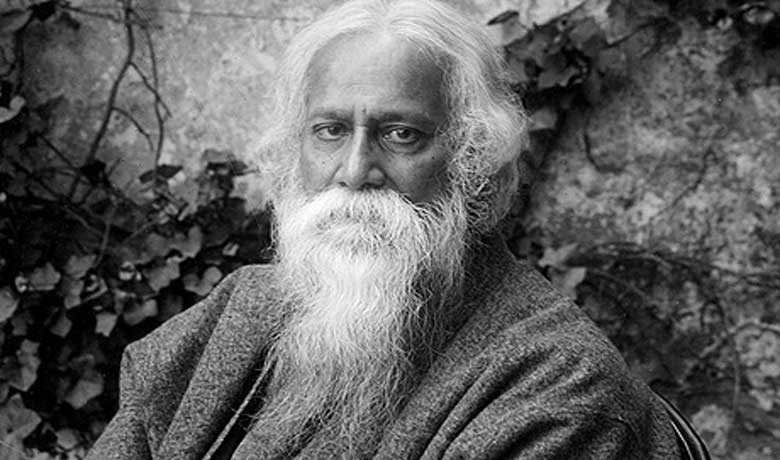News >> Literature
 07 May, 2015
07 May, 2015
Rabindranath Tagore was a Bengali poet, novelist and painter best known for being the first non-European to be awarded the Nobel Prize. He was the Bengali polymath who reshaped Bengali literature and music, as well as Indian art with Contextual Modernism in the late 19th and early 20th centuries.
The great and legendary poet Tagore was born on May 7, 1861, the 25th Baishakh in Bangla calendar, in a zamindar (a holder or occupier of land) family in Kolkata.
Tagore died at the age of 80 on August 7, 1941 the 22nd of the Bengali month of Shraban. His anniversary of death is observed in Bangladesh on Sraban 22 in Bangla calendar.
Rabindranath was the first non-European poet who won Nobel Prize for literature. He won the prize in 1913 for ‘Song Offerings, the English translation of `Gitanjali`, an anthology of his poems.
The youngest of thirteen surviving children, Tagore was born in the Jorasanko mansion in Calcutta, India to parents Debendranath Tagore and Sarada Devi. The Tagore family came into prominence during the Bengal Renaissance that started during the age of Hussein Shah. The original name of the Tagore family was Banerjee. Being Brahmins, their ancestors were referred to as `Thakurmashai` or `Holy Sir`.
Rabi was raised mostly by servants; his mother had died in his early childhood and his father travelled widely. Tagore largely avoided classroom schooling and preferred to roam the manor or nearby Bolpur and Panihati, idylls which the family visited.
Tagore loathed formal education—his scholarly travails at the local Presidency College spanned a single day. Years later he held that proper teaching does not explain things; proper teaching stokes curiosity.
Because Debendranath wanted his son to become a barrister, Tagore enrolled at a public school in Brighton, East Sussex, England in 1878. He briefly read law at University College London, but again left school.
However, his poetry in translation was viewed as spiritual, and this together with his mesmerizing persona gave him a prophet-like aura in the west. His "elegant prose and magical poetry" still remain largely unknown outside the confines of Bengal.
A Pirali Brahmin from Kolkata, Tagore had been writing poetry since he was eight years old. At age 16, he published his first substantial poetry under the pseudonym (pen name) Bhanushingho ("Sun Lion") and wrote his first short stories and dramas in 1877.
Tagore modernised Bengali art by spurning rigid classical forms and resisting linguistic strictures. His novels, stories, songs, dance-dramas, and essays spoke to topics political and personal. Gitanjali (Song Offerings), Gora (Fair-Faced) and Ghare-Baire (The Home and the World) are his best-known works, and his verse, short stories, and novels were acclaimed—or panned—for their lyricism, colloquialism, naturalism, and unnatural contemplation.
Besides, “Shesher Kabita” is also a novel by Rabindranath Tagore, widely considered a landmark in Bengali literature. The novel was serialised in 1928, from Bhadro to Choitro in the magazine Probashi, and was published in book form the following year. It has been translated into English as ‘The Last Poem’ (translator Anandita Mukhopadhyay) and ‘Farewell Song’ (translator Radha Chakravarty).
His compositions were chosen by two nations as national anthems: India`s Jana Gana Mana and Bangladesh`s Amar Shonar Bangla.
Known mostly for his poetry, Tagore wrote novels, essays, short stories, travelogues, dramas, and thousands of songs. Of Tagore`s prose, his short stories are perhaps most highly regarded; he is indeed credited with originating the Bengali-language version of the genre.
His works are frequently noted for their rhythmic, optimistic, and lyrical nature. Such stories mostly borrow from deceptively simple subject matter: commoners. Tagore`s non-fiction grappled with history, linguistics, and spirituality.
On the occasion of Tagore`s 150th birthday an anthology (titled Kalanukromik Rabindra Rachanabali) of the total body of his works is currently being published in Bengali in chronological order. This includes all versions of each work and fills about eighty volumes.
In 2011, Harvard University Press collaborated with Visva-Bharati University to publish The Essential Tagore, the largest anthology of Tagore`s works available in English.
Tagore was a prolific composer with 2,230 songs to his credit. His songs are known as rabindrasangit ("Tagore Song"), which merges fluidly into his literature, most of which—poems or parts of novels, stories, or plays alike—were lyricised.
Tagore influenced sitar maestro Vilayat Khan and sarodiyas Buddhadev Dasgupta and Amjad Ali Khan. His songs are widely popular and undergird the Bengali ethos to an extent perhaps rivalling Shakespeare`s impact on the English-speaking world.
It is worth to be mentioned that Tagore founded Visva Bharati University at Santiniketan in 1921 which draws scholars from all over the world.
Source: risingbd

